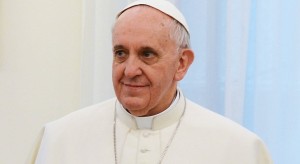
By Sarah Mac Donald - 14 July, 2015
 Pope Francis has said he will focus more on the plight of the middle classes and acknowledged that up to now he has been focused on the polarisation between the rich and the poor and the ‘throw-away’ culture.
Pope Francis has said he will focus more on the plight of the middle classes and acknowledged that up to now he has been focused on the polarisation between the rich and the poor and the ‘throw-away’ culture.
In an hour-long press conference on the flight back from Asuncion, the capital of Paraguay to Rome, the Pontiff was asked why there was so little in his messages for the people who work and pay their taxes.
The Pope thanked the journalist for a “good correction” and described it as “an error of mine not to think about this”.
Describing the world as polarised, Pope Francis said the middle class becomes smaller in that context while the polarisation between the rich and the poor is big.
“Some nations are doing very well, but in the world in general the polarisation is seen. And, the number of poor is big. Why do I speak of the poor? Because they’re at the heart of the Gospel,”he explained.
On the middle classes, he said he had said “some words” but “in passing”.
Regarding the “the common people, the simple people, the worker” who is of “great value” the Pontiff admitted, “I think you’re telling me about something I need to do.”
Elsewhere in his inflight press conference, the Pope fielded reporters’ questions about the current situation in Greece and said all the blame could not be put on that country.
He said he hoped the international community would find a solution, and also provide ways to prevent something similar occurring in other countries.
Asked about Bolivian President Evo Morales’ presentation to him of a crucifix with the hammer and sickle, Pope Francis described it as protest art.
The crucifix is a replica of a work by assassinated Jesuit priest, Fr Luís Espinal, who was tortured and killed by Bolivian paramilitary squads in 1980.
Pope Francis prayed at the site of Fr Espinal’s assassination upon his arrival in Bolivia.
Referring to Fr Espinal as a sculptor and a poet, the Pontiff commented, “It was not offensive to me”.
He highlighted that as Fr Espinal was killed in 1980, a time when liberation theology had many different branches, one of which was the Marxist analysis of reality to which the Jesuit priest belonged.
Recalling how the congregational leader of the Jesuits at the time, Fr Arrupe, had written to the members of the Society of Jesus on the Marxist analysis of reality in theology stating that it was not correct, Pope Francis also referred to the CDF’s criticisms of liberation theology.
It was Fr Espinal’s life he praised.
“He was a special man, with so much human geniality, who fought in good faith.”
He added that seeing the crucifix through the hermeneutic of Fr Espinal’s life and thinking, “I understand this work. It was not offensive to me. But I had to use this hermeneutic. And I say this to you so that there aren’t any wrong opinions.”